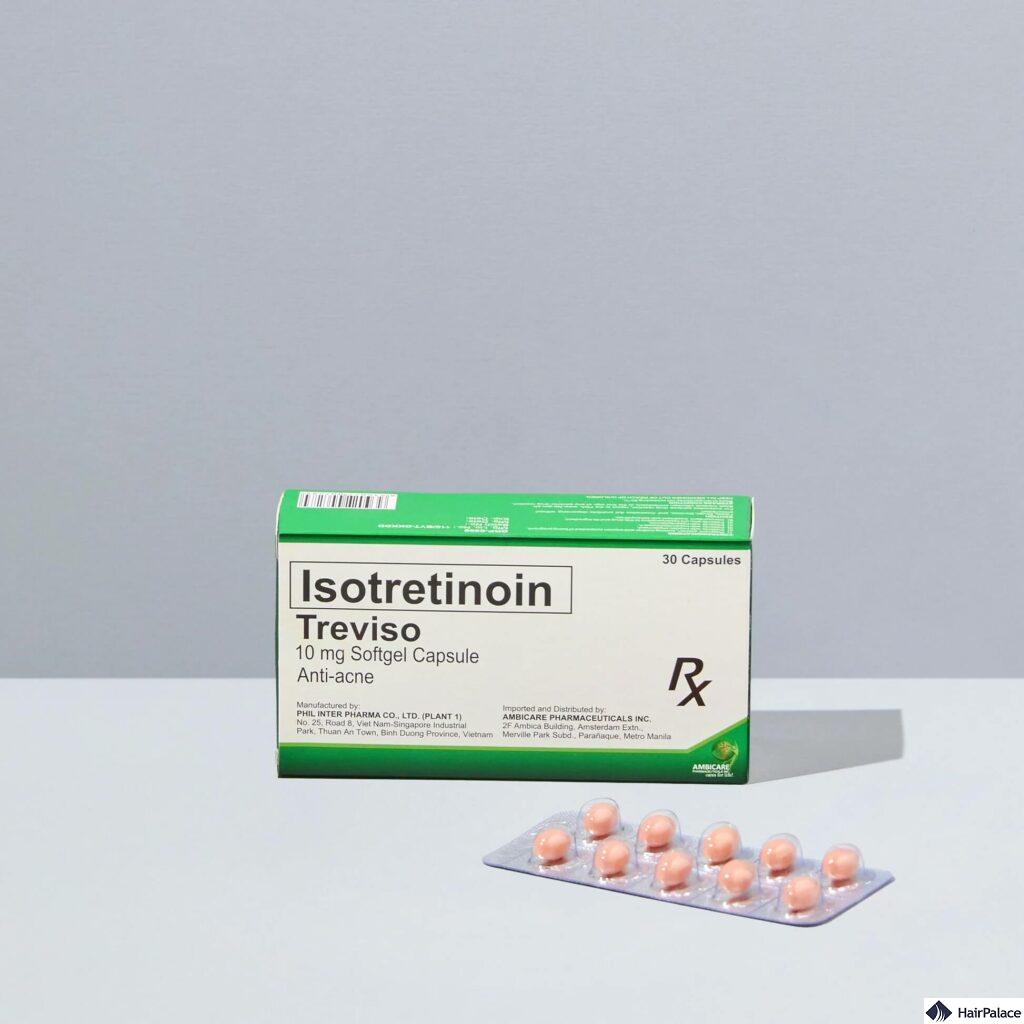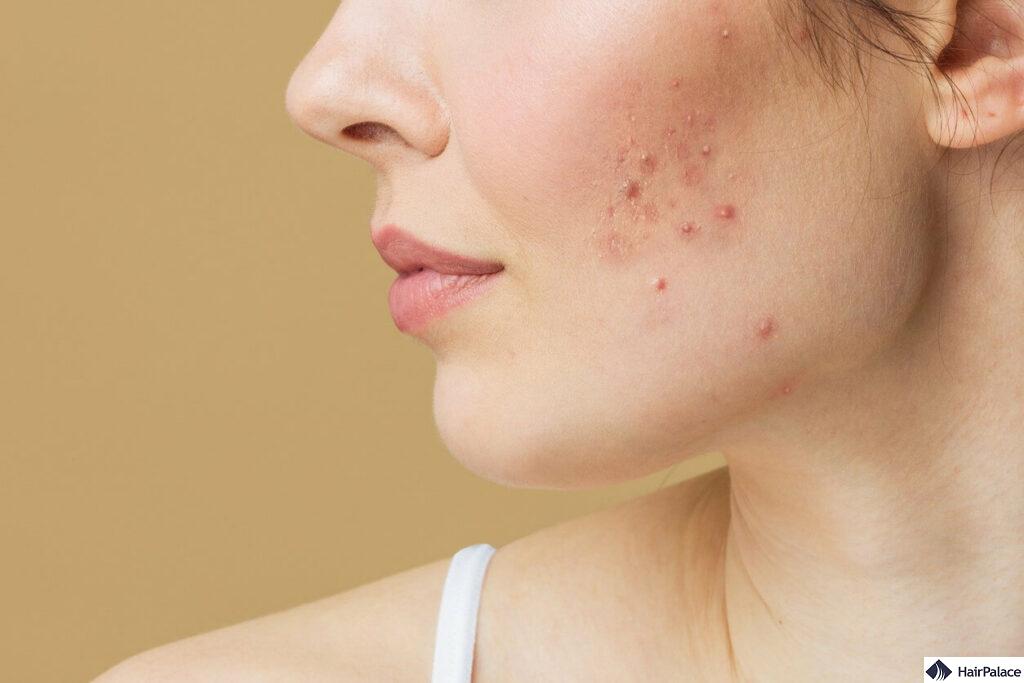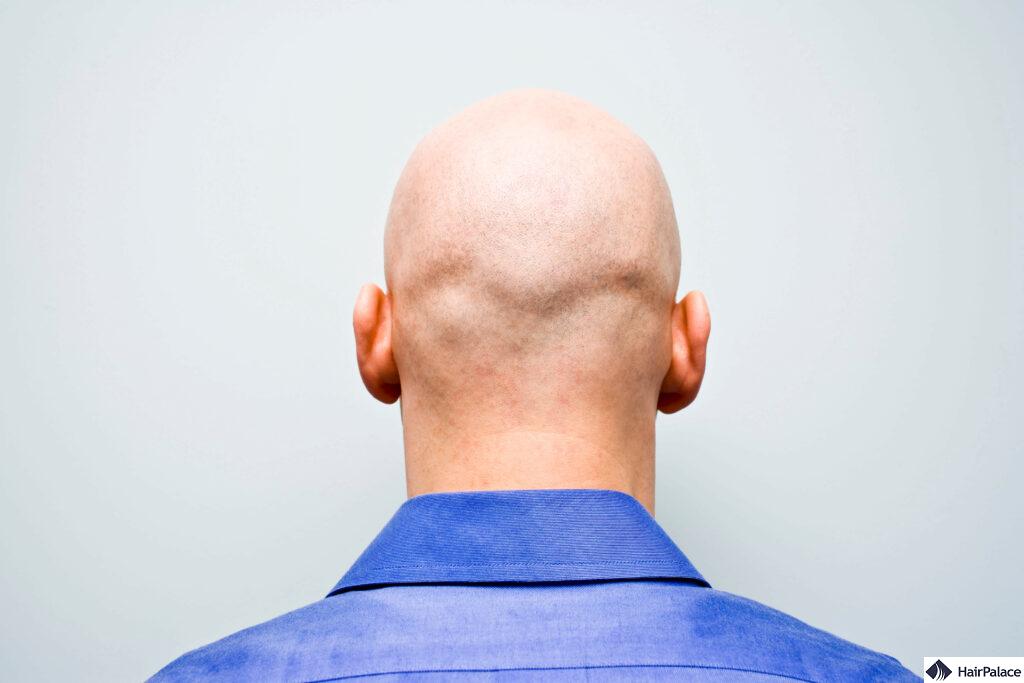Does Accutane Cause Hair Loss?

Accutane (discontinued in 2009) is a powerful medication containing isotretinoin renowned for its effectiveness in treating severe acne.
While it can bring significant skin improvements, some users worry about the potential side effects of hair loss.
Though not always, hair thinning or shedding can occur during treatment, raising concerns for those considering or already on the medication.
In this article, we’ll explore why Isotretinoin may cause hair loss, how frequently it happens, and what you can do to prevent or manage it.
Understanding these effects can help users make informed decisions while navigating the benefits and risks of Accutane.
- What is isotretinoin?
- Does isotretinoin cause hair loss?
- Is isotretinoin hair loss permanent?
- Why does isotretinoin-induced hair loss occur?
- How to prevent accutane hair loss
What is isotretinoin?

Isotretinoin is a powerful medication primarily used to treat severe acne, particularly cystic acne that doesn’t respond to other treatments like antibiotics.
It is a derivative of vitamin A (retinoid) and works by reducing the production of oil (sebum) in the skin, shrinking the size of oil glands, and helping to prevent clogged pores.
Though highly effective, Isotretinoin is associated with serious side effects, including:
- Dry skin, lips, and eyes: This is one of the most common side effects.
- Birth defects: It is highly teratogenic, meaning it can cause severe birth defects if taken during pregnancy. Women on Isotretinoin must follow strict contraceptive measures.
- Mood changes: Some users report depression or mood swings.
- Liver function issues: It can affect liver enzymes, so regular monitoring is needed.
Due to these risks, it is typically prescribed under close medical supervision. Despite the potential side effects, it can lead to long-term remission of acne after treatment.
Does isotretinoin cause hair loss?

Isotretinoin acne treatment can cause hair loss, though it is an uncommon side effect.
The medication affects the sebaceous glands and, in some cases, can impact hair follicles, leading to temporary hair thinning and hair loss during treatment.
This side effect is usually temporary, and hair often grows back after the medication is discontinued.
The extent of hair loss can vary based on the individual’s response to the drug and the dosage.
If accutane-related hair loss is severe or concerning, it’s important to consult a healthcare provider.
They might adjust the dosage or recommend alternatives to treat acne.
Is isotretinoin hair loss permanent?

In most cases, Isotretinoin treatment only causes temporary hair loss. Hair typically grows back after treatment is stopped.
Hair loss usually occurs because Isotretinoin can dry out the scalp and reduce the production of oils that help keep hair healthy.
It may also temporarily shorten the hair cycle, leading to increased shedding.
However, in rare cases, some people may experience longer-lasting or more significant hair thinning.
The likelihood of permanent hair loss is low.
Still, if thinning hair does not regrow after several months of discontinuing the medication, it’s essential to consult a healthcare provider to rule out other causes.
Managing dryness and taking care of your hair during treatment may help reduce the severity of this side effect.
Why does isotretinoin-induced hair loss occur?
Isotretinoin-induced hair loss occurs due to several factors related to how the medication affects the body, particularly the skin and hair follicles.
Here are the key reasons:
- Sebum reduction: Isotretinoin therapy drastically reduces sebum production, the oily substance produced by sebaceous glands that lubricate the skin and hair. This can lead to dry, brittle hair, which may become more prone to shedding and breakage.
- Disruption of the hair growth cycle: Taking isotretinoin can alter the normal hair growth cycle by shortening the anagen phase (growth phase) and pushing hair follicles into the telogen phase prematurely. This results in increased hair shedding, known as telogen effluvium.
- Vitamin A toxicity effects: Isotretinoin is a derivative of vitamin A, and high levels of vitamin A (or retinoids) can lead to hair disorders. Excessive vitamin A can affect hair follicles and lead to shedding.
- Inflammation of hair follicles: In some cases, isotretinoin may trigger mild inflammation of the hair follicles, which can contribute to hair thinning or loss.
- Overall body dryness: The drying effects of the drug are not limited to the skin but can extend to the scalp, which can lead to poor scalp health, making hair more fragile.
These mechanisms combined can lead to hair loss in acne patients, though it’s usually temporary and reverses after the medication is stopped.
How to prevent accutane hair loss

Preventing or minimizing Isotretinoin (Accutane) hair loss involves managing the side effects of the medication, especially the dryness and disruption of the hair growth cycle.
Here are some strategies to help reduce the risk of hair loss:
1. Keep your scalp and hair moisturized
Opt for shampoos that are sulfate-free and formulated for dry or sensitive scalps. Avoid harsh, drying shampoos that could further irritate the scalp.
Apply a hydrating conditioner or hair mask to keep your hair moisturized and prevent hair damage.
Furthermore, natural oils like coconut, argan, or jojoba oil can help moisturize your scalp and prevent dryness that might contribute to hair shedding.
2. Maintain a healthy diet
Aim to consume foods rich in vitamins and minerals: A diet rich in vitamins B, C, D, E, and zinc can promote hair growth and increase hair density.
Consider eating foods like leafy greens, eggs, nuts, and fish that support hair health.
Some people find biotin (vitamin B7) supplements helpful for hair strength, though you should consult your doctor before adding any supplements, especially while on isotretinoin.
3. Avoid heat styling and chemical treatments
Minimize the use of heat-styling tools (like blow dryers, flat irons, and curling wands) that can cause further damage to your hair shafts and scalp.
Avoid chemical treatments like dyeing, bleaching, or perming, which can weaken hair and exacerbate breakage.
4. Try oral supplements
Speak to your doctor about taking hair-friendly supplements, such as omega-3 fatty acids, biotin, or multivitamins formulated for hair, skin, and nails.
Be cautious with vitamin A, as Accutane prescription medication is a retinoid, and excessive vitamin A can worsen thinning hair.
5. Reduce scalp irritation
Avoid tight hairstyles like ponytails, buns, or braids that pull on your hair and stress the follicles.
Use a soft hairbrush or wide-tooth comb to minimize pulling and breakage when styling or brushing your hair.
6. Manage dosage with your doctor
Consult your dermatologist if hair loss becomes severe. They may consider adjusting your dosage or recommending treatments to counteract hair thinning.
7. Address dryness internally
Drink plenty of water: Hydration is crucial to combat the overall dryness Isotretinoin causes. This can help maintain the moisture balance in your scalp.
8. Topical treatments
Consider using topical minoxidil (Rogaine) or other hair-growth-promoting treatments, but only after consulting with your healthcare provider to ensure it is safe during Isotretinoin treatment.
Last medically reviewed on April 11th, 2025
- Wooltorton E. Accutane (isotretinoin) and psychiatric adverse effects. CMAJ. 2003 Jan 7;168(1):66. PMID: 12515789; PMCID: PMC139322.https://pubmed.ncbi.nlm.nih.gov/12515789/
- Lytvyn Y, McDonald K, Mufti A, Beecker J. Comparing the frequency of isotretinoin-induced hair loss at <0.5-mg/kg/d versus ≥0.5-mg/kg/d dosing in acne patients: A systematic review. JAAD Int. 2022 Feb 10;6:125-142. doi: 10.1016/j.jdin.2022.01.002. PMID: 35199047; PMCID: PMC8841364.https://pubmed.ncbi.nlm.nih.gov/35199047/
- Tran PT, Evron E, Goh C. Characteristics of Patients with Hair Loss after Isotretinoin Treatment: A Retrospective Review Study. Int J Trichology. 2022 Jul-Aug;14(4):125-127. doi: 10.4103/ijt.ijt_80_20. Epub 2022 Jul 16. PMID: 36081443; PMCID: PMC9447463.https://pubmed.ncbi.nlm.nih.gov/36081443/
- KmiećML, et al. (2013). Evaluation of biophysical skin parameters and assessment ofhair growth in patients with acne treated with isotretinoin. DOI:https://www.termedia.pl/Original-paper-Evaluation-of-biophysical-skin-parameters-and-assessment-of-hair-growth-in-patients-with-acne-treated-with-isotretinoin,7,21911,0,1.html
- Isotretinoin (marketed as Accutane)capsule information. (2018). https://www.fda.gov/Drugs/DrugSafety/ucm094305.htm


